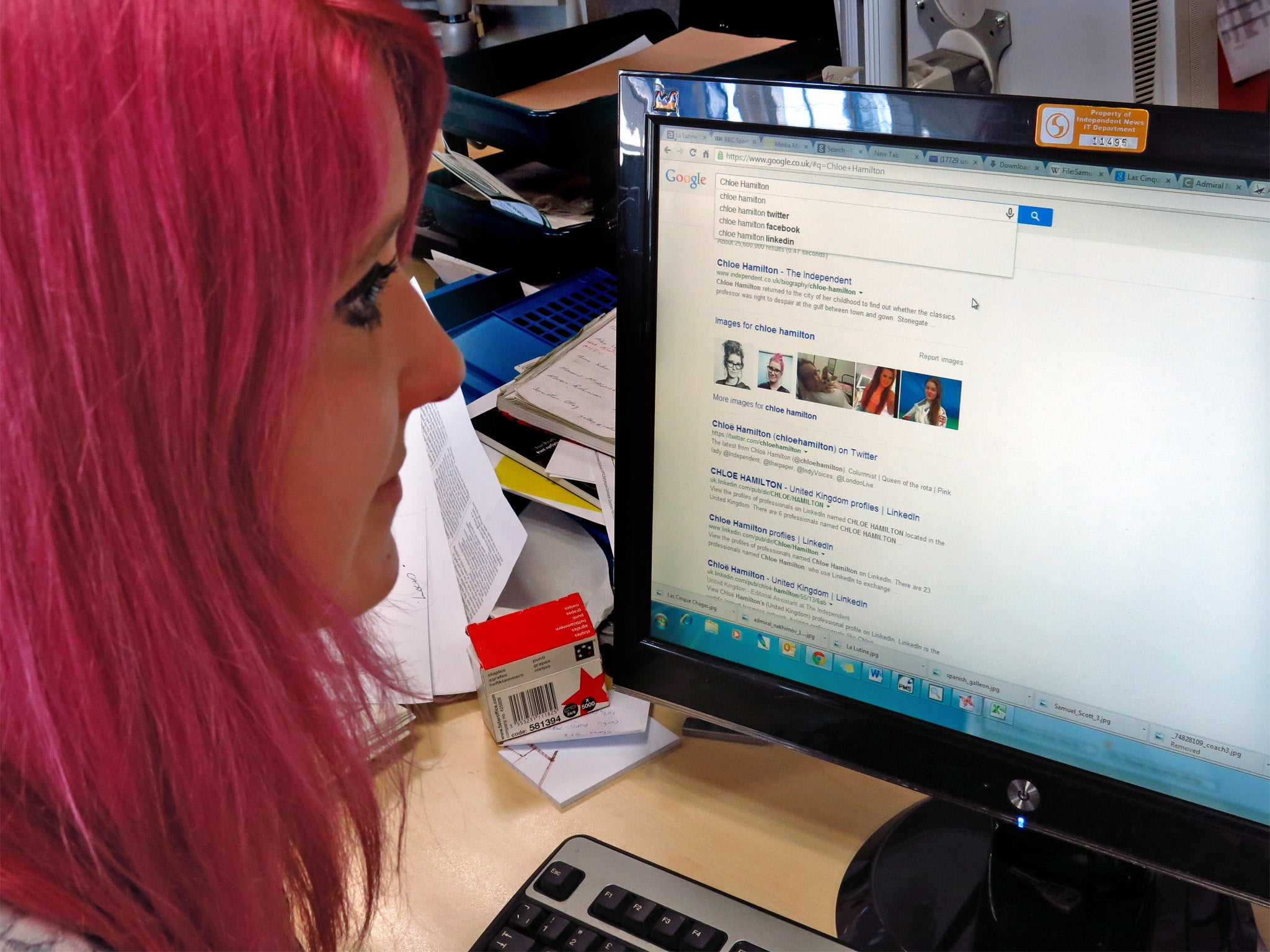Disappearing act: how easy is it to clean up after yourself on Google?
It’s not simple to get an embarrassing photo wiped, writes Chloe Hamilton


Your support helps us to tell the story
From reproductive rights to climate change to Big Tech, The Independent is on the ground when the story is developing. Whether it's investigating the financials of Elon Musk's pro-Trump PAC or producing our latest documentary, 'The A Word', which shines a light on the American women fighting for reproductive rights, we know how important it is to parse out the facts from the messaging.
At such a critical moment in US history, we need reporters on the ground. Your donation allows us to keep sending journalists to speak to both sides of the story.
The Independent is trusted by Americans across the entire political spectrum. And unlike many other quality news outlets, we choose not to lock Americans out of our reporting and analysis with paywalls. We believe quality journalism should be available to everyone, paid for by those who can afford it.
Your support makes all the difference.Every internet user has Googled themselves at least once – if you say you haven’t, you’re lying. And typing your own name into the search engine generates conflicting emotions: anxiety and excruciating excitement. What will I find? Will I be first on the list of results? Will that photo of me with two cigarettes stuffed up my nose still be the top image?
But what happens if we stumble across something we consider to be irrelevant or outdated, or even something that might infringe on our privacy?
Keen to find out just how easy it would be to be “forgotten” by a global search engine, following the court ruling that Google must amend some search results at the request of ordinary people, I decided to try to get a photo of myself (a terrible one from last summer in which I’m trying desperately to hide my newly-fitted braces) permanently erased from all Google searches.
My first point of call is, of course, the search engine itself. Typing “how to get Google to remove something” into Google throws up a number of results, the first of which is the company’s support page. I trawl my through various Contact Us options, but struggle to find a number for a helpline. Are theirs the only contact details not available via their all-seeing online powers?
Clicking my way through incomprehensible questions, however, I discover that if I want a webpage removed I should go directly to the site’s webmaster. For those not in the know, Google helpfully explains that a webmaster is someone who controls the content on websites – not, as I’d suspected, a megalomaniac who runs the internet.
Disappointed with this response, I tick a box telling Google that the overlord has been unresponsive to my request. Google then asks me what I want removed and provides a list of options: a picture, contact details, a government-issued ID number, bank details, a photograph of my signature, inaccurate information about myself, and so on.
I choose “picture” and come up against another brick wall. The reply tells me there’s very little that Google remove from search results “on a discretionary basis”. Requests to remove contact details and inaccurate information yield the same response. Apparently, the search engine won’t remove webpages on the whims of silly girls who want to bury bad photos of themselves.
Requests to delete ID numbers, bank details, and signatures are treated with a little more consideration. Again, I’m told to contact the webmaster, but this time Google asks me to provide more information and I send a form off into the ether.
I try a different approach next, calling the Google press office to see if they can help. I’m directed back to the support page and again told to contact the webmaster of the page I want removed. However, they explain that as the search engine is an index of all of the webpages on the internet, they can in theory remove pages from their results, but it’s better to approach a webmaster who can get the content removed altogether. After all, a page removed from Google’s results can still be found through another engine, such as Bing or Yahoo.
“People make the mistake of thinking that Google is the internet, which is flattering but inaccurate,” says a Google spokesperson. “Even if Google was to take down content, if you went to another search engine you would find it there.”
The issues of censorship and privacy remain, but according to Google it is not they but the webmasters who hold the real power.
Join our commenting forum
Join thought-provoking conversations, follow other Independent readers and see their replies
2Comments